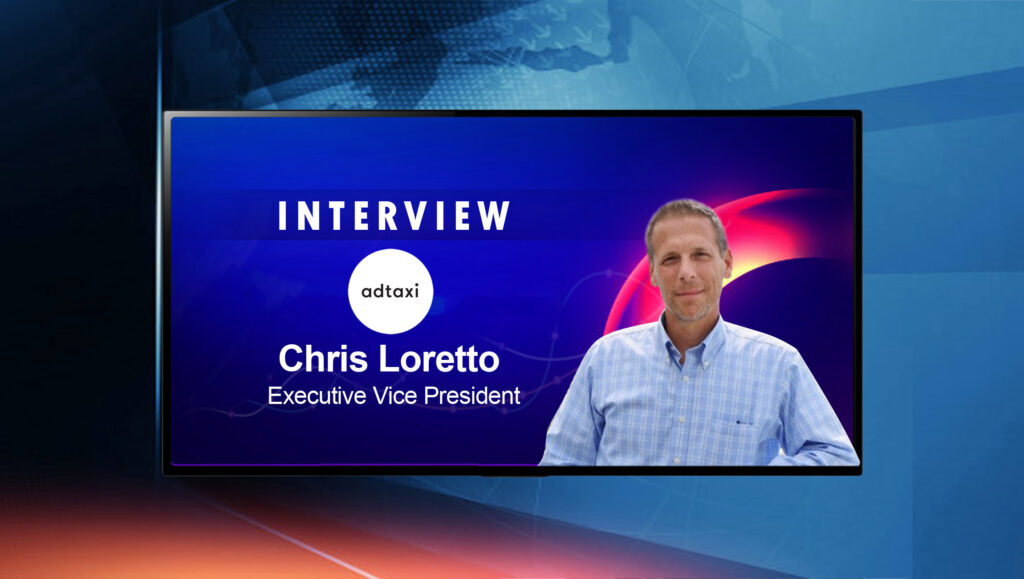Chris Loretto, Executive Vice President at Adtaxi chats about the long term change that programmatic trends will drive in the typical B2B marketing-ad sales-publisher relationship in this quick chat:
_____
Hi Chris, we’d love to hear about your journey through the years…tell us more about your role at Adtaxi
I began my career in sales heavily focused on the B2B side, particularly around consumer packaged goods. I learned early on to rely on data and research to help clients make informed marketing decisions. When I joined Adtaxi in one of the local regions, the business still had a narrow focus on expanding print customers’ portfolios to include digital products for greater reach and customer engagement.
As I transitioned into a corporate leadership role, we began to shift our vision beyond our core print customers. From my experience, we were better suited to scale our growth and shape the agency by relying on data and research when helping customers. This became the tipping point of my journey, moving from an integrated service arm within a media company to an independent, large scale digital agency that looked beyond just adding products but really took the time to evaluate a client’s primary objective and find ways to integrate media to drive growth and sales based on their business needs and goals.
Read More: SalesTechStar Interview Kash Shaikh, CEO And President At Virtana
We’d love to hear about some key changes and trends you’ve been observing in B2B media today? How is the publisher-marketer-advertiser relationship evolving?
The biggest change I’ve seen is a transition of focus from high volume sales to a stronger emphasis on client success and retention and customer lifetime value. At Adtaxi, we continue to foster this crucial portion of the business by making significant investments in our client services initiatives. This includes expanding our Client Services team, and the resources they need to be successful. By empowering them to analyze customer data and campaign results, we are able to concentrate more heavily on strategic consulting and provide a better customer experience. We have learned to take a more holistic view of campaigns through key highlights and KPIs and apply those learnings to produce higher ROAS and improved ROI to drive our clients’ businesses forward through tangible results. We have come to understand that running a client’s campaign or managing their media investment reflects only a small portion of the value of working with an agency. By integrating our insights and experience through strategic consultation we are able to look at the broader picture of each brand’s customer journey.
We have found we can fine tune our approach by taking the time to notice not only how each media campaign is performing independently, but also working together to produce results. Analyzing this data allows for a deeper understanding of how and where to not only make the most impact but more importantly, the right impact for businesses and their customers to maximize the lifetime value of key shoppers.
This partnership approach to moving a client’s entire business forward, not just the miopic pieces of the media campaigns, has transformed the industry and will continue to contribute to its evolution as products and platforms change. The ability to capture and interpret data and connect the dots at a higher level lends to a more granular level of understanding for each business. It’s now more important than ever to realize every sale and every customer, even every business within the same industry, are not equal.
In what ways do you feel impact of traditional and digital media will change depending on current business trends, how do you feel sales teams and marketers should work together more closely to create a more robust media mix today?
To be successful, transparency is key. Facilitating open conversations around business objectives, goals, and pain points between sales and marketers will help to adequately address and deliver the best results. It should be less about the specific media channel and more about understanding and solving business problems. That’s where the focus has to be in this fluid, fast-paced digital environment for all parties to be successful.
Read More: SalesTechStar Interview With Patrick Guidi, Sales Director UK, US & Northern Europe At Mapp…
Can you share 5 top of mind highlights on the impact of adtech in digital advertising and how the future of advertising will be defined by programmatic trends?
The impact of adtech in digital advertising is really centered around scale, automation, data interpretation, product extensions, and strategic partnerships.
As adtech continues to advance, being able to address a wide range of needs and pain points simultaneously has allowed for greater scale and automation. Combining this with the ability to interpret complex data sets faster is really changing the way agencies do business.
The advancement of product and product extensions allows for new and more sophisticated approaches to tackling a customer’s problem, leading to better results. Having increased inventory and media enhancements provides advanced solutions to even the most complex customer problems.
One of the powerful influences has been strategic partnerships. By working closely with some of the biggest names in the business, agencies can expand their expertise, get a larger perspective on the marketplace, and really challenge the way they think and do business with advertisers. It really provides a competitive advantage to know how to get in front of the right audiences with the right platforms and technology.
Video and CTV will continue to grow in the space as their potential only expands. These formats really resonate with audiences and allow for a different connection between products and consumers. Being able to adjust not only the approach but the messaging for effective optimization will really help brands make a powerful impact.
The automation available through programmatic platforms will continue to grow in importance as it helps to reduce or eliminate manual processes. This will allow teams to have more time to dig into the data from a consultative and strategic standpoint. Creating efficiencies through automation lets teams focus on high value activities and optimize more effectively to maximize ROI.
What are some core sales technologies and customer experience technologies that you feel should form the crux of a tech stack for a customer facing team?
To be successful a fully integrated, end-to-end CRM system is critical. There needs to be a central point to track details from lead capture through fulfillment and then connect to billing and reporting. This allows everyone to be on the same page from start to finish. Expectations can be properly managed through effective communication and for the agency, they then have one source of truth for customer records, intelligence, and performance to manage business efficiently.
A few thoughts on what you feel today’s sales and marketing leaders need to do differently (and suggestions on martech / salestech) to help them stand out from the crowd and create a better buying experience for their prospects and customers.
Focus all of your energy and attention on efforts that produce positive ROI for your customers. Often sales leaders waste valuable time and resources on things that aren’t precise and neglect what really matters to their client’s business. Taking the time to understand business’s challenges and help them grow and drive the results that matter will help you stand out.
This should include a greater emphasis on building customer success teams and resources that are able to help scale efforts efficiently and effectively. Top line revenue is great but what will give you longevity is building teams that really listen to customers and deliver results to move the needle for them. You’ll not only create a healthier business model, but you’ll also be around a lot longer.
Read More: SalesTechStar Interview With Paul Farmer, Global Senior Vice President At VoltDB, Inc.

Founded in 2010 within MediaNews Group, Adtaxi made its mark in programmatic advertising before expanding into search, social, and connected TV. Over time, Adtaxi has refined and perfected its holistic performance-based strategy. Leveraging the power of people plus technology, Adtaxi’s innovative full-funnel methodology utilizes a variety of tools and processes. By using omnichannel optimizations across channels throughout the client lifecycle, they are able to maximize performance and deliver superior value for advertisers. Adtaxi functions as a true partner with its clients, acting as a single point of contact and support through multi-platform campaign cycles.
Chris Loretto has served as MediaNews Group’s Chief Digital Officer and EVP Digital since August 2014. He currently provides strategic leadership for all key functional areas across the digital organization including Product, Development, Technology, Revenue, Operations, Audience, Marketing and Training. Prior to his current role with the company he was Vice President of Digital for the Los Angeles News Group from 2011-2014.
Serving on the Board of the Local Media Consortium since 2014 and as Board Chair since 2017, Chris takes an active strategic leadership role to drive and support the LMC’s Mission. Currently he helps lead several committees including NewsNext and The Branded Content Project. He is also actively involved with the IAB, INMA and NAA industry associations.
Prior to MediaNews Group, Chris was Director of Interactive media, Product Development and Marketing at The Times Media Company of Northwest Indiana before being promoted to Regional Executive for Mid-Valley Newspapers and publisher of three mastheads. At The Times, he was responsible for building audiences, developing digital and print products, and leading strategic marketing initiatives, branding, product marketing support, trade partnerships, promotions and community events. Companywide responsibilities included serving on the Digital Directors Steering Committee and Marketing Management Committee.
Before joining The Times in 2006, he was publisher for several business-to-business publications at Nielsen Media in New York. Chris is a veteran of the Marine Corps and a graduate of Stony Brook University with a degree in Economics.
Catch the latest B2B Marketing and Sales Conversations with these latest episodes of The SalesStar Podcast!
Episode 93: How Do You Build An Impactful Customer Success Model: With Daljit Bamford, Tenth Revolution Group
Episode 92: B2B Marketing Learnings And Martech Tips With Jon Perera, CMO At HighSpot
Episode 91: Top Trends And Concerns Of B2B Revenue Teams: With Sylvia Ananicz, Head Of Revenue At Lilt





















